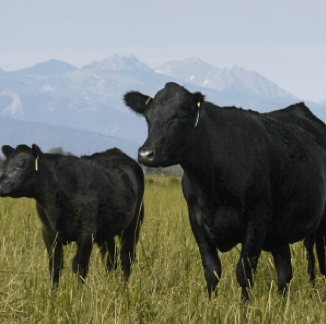MSU researchers win grant for ‘Beef to School’ research
Friday Jun. 26th, 2015
A team of Montana State University researchers and community partners has been awarded a three-year, $220,000 grant to help Montana beef producers and meat processors and increase the use of local beef in Montana’s schools and communities.
The grant, from the U.S. Department of Agriculture’s Western Region Sustainable Agriculture Research and Education Program, is intended to increase the availability and consumption of local beef in Montana’s schools and communities and help improve Montana beef producers’ and meat processors’ viability and sustainability. It is also intended to discern which “beef to school” methods are most sustainable for producers, processors and schools.
The team is led by Carmen Byker Shanks, assistant professor in the MSU Department of Health and Human Development.
In Montana and nationally, producers and consumers are beginning to see social, environmental and economic benefits from local procurement efforts that link ranchers and local beef processors with schools in their community and region, according to Byker Shanks. She added that the ‘beef to school’ efforts involve support of local beef from a variety of people, including producers, processors, and foodservices and students at K-12 schools.
“Beef to school efforts can increase the sustainability and viability of local and regional food systems,” Byker Shanks said. “The recently published 2015 dietary guidelines for Americans highlights that beef production has a potentially large impact on the environment. In Montana and beyond, it is important to support beef production through efforts such as beef to school programs. Beef to school programs have the potential to reduce the need for transportation, packaging, and other inputs; increase access to local food; provide farmers an additional market for their beef; enhance community food literacy and connections to local agriculture; keep money circulating in local economies; and possibly utilize cattle that are grass-fed.”
Byker Shanks noted that the Montana Beef to School Coalition – a group formed in 2012 that includes a range of representatives, from school foodservice to meat processors and producers to food and agricultural organizations and agencies – has identified four items that are needed to grow beef to school programs in the state. Those items include identifying current successful models of beef to school efforts, analyzing the capacity and motivations of beef producers and meat processors to fill the demand for local beef, an availability of resources about how to make beef to school efforts economically and nutritionally viable for schools, and implementing strategies to include beef to school programming at schools.
To address these needs, researchers will conduct comprehensive case studies of current beef to school efforts to identify the benefits, challenges, best practices and gaps that exist for beef to school procurement models, Byker Shanks said. Additionally, the team will examine how local beef is utilized in schools and evaluate student acceptance and preference of local versus non-local beef.
Researchers will then use this information to evaluate the larger Montana beef to school market by developing and testing evaluation tools, analyzing characteristics of beef to school supply chain issues, and assessing capacity and needs for slaughter, processing and storage facilities.
“As schools and ranchers in Montana are beginning to work together to bring local beef into schools, the results have been mixed: some procurement models seem successful for all parties involved, while others have faced significant barriers in making beef to school programs viable,” Byker Shanks said “These evaluation results will help create solutions to overcoming barriers to optimizing beef to school efforts.”
The researchers will also develop extensive outreach, educational and promotional materials for multiple groups, including K-12 students and teachers, university students, producers and school foodservice programs. Outreach efforts will also include both in-person trainings and webinars for school foodservice, producers and processors.
“The tools and findings of this project will give Montana’s producers, processors and schools the resources they need to form productive, sustainable procurement relationships,” Byker Shanks said, adding that those resources will be applicable to other stakeholders, as well. “Additionally, this project will foster partnerships among producers, processors and other stakeholders, garnering long-term interest and investment in local and regional beef markets as well as the sustainable production and marketing of other local and regional meat products.”
In addition to Byker Shanks, others involved with the project include Thomas Bass and Joel Schumacher of MSU Extension, Karla Buck of Bear Paw Meats, Katie Halloran of National Center for Appropriate Technology, Jennifer Montague of Kalispell Public Schools Foodservice, Garl Germann of Montana Meats, Jeremy Plummer of Lower Valley Processing, John Polacik of Park High School Foodservice, Aubree Roth of Montana Team Nutrition and members of the Montana Beef to School Coalition.
For more information, contact Byker Shanks at Carmen.byker@montana.edu or visit the Montana Beef to School Coalition’s Facebook page at https://www.facebook.com/beef2school or its Twitter account at https://twitter.com/mtbeeftoschool.
| Tweet |